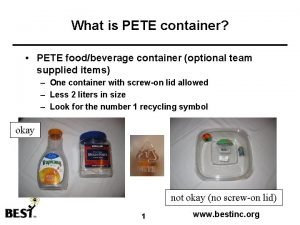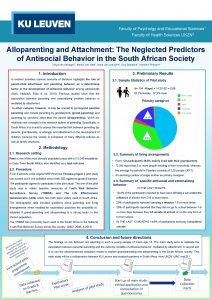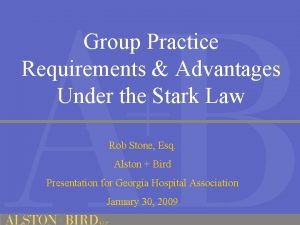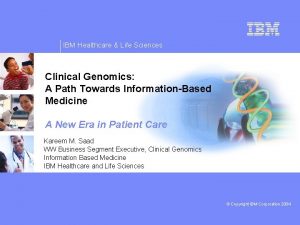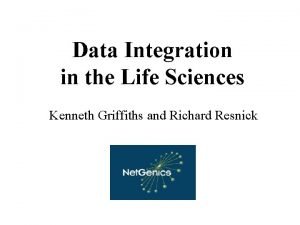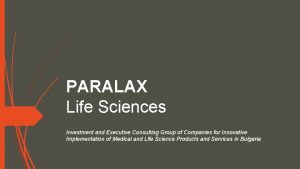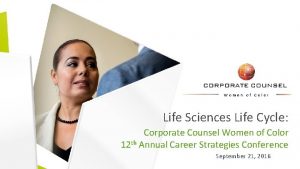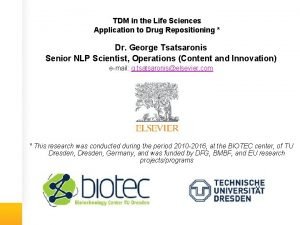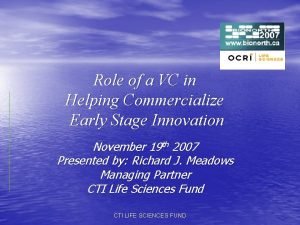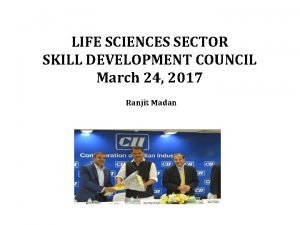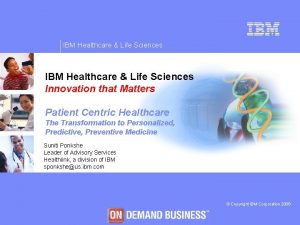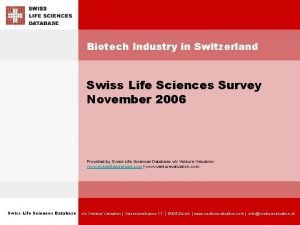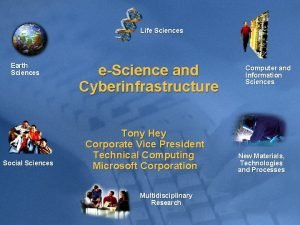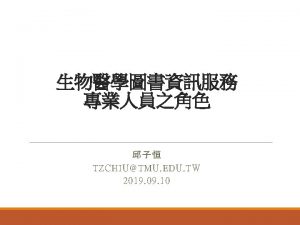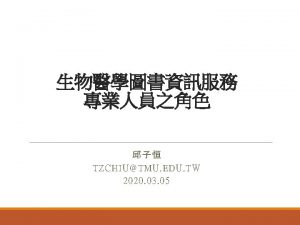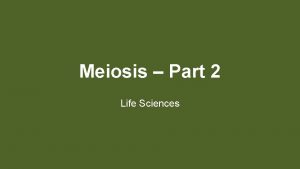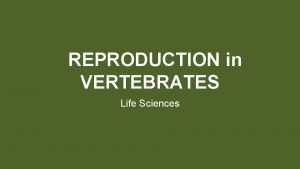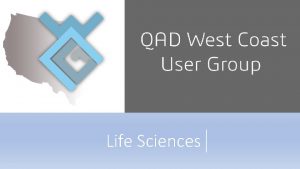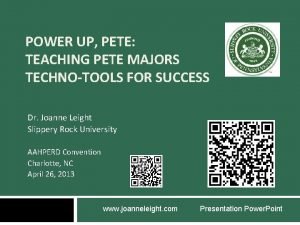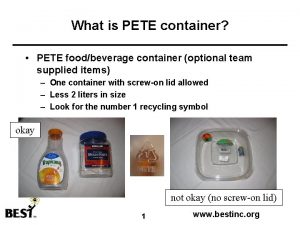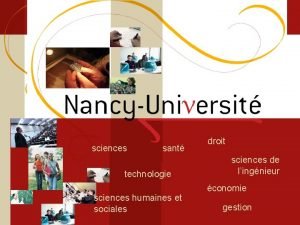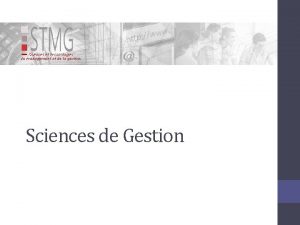Pete Alston School of Life Sciences Pete Alston

















- Slides: 17

Pete Alston School of Life Sciences @Pete. Alston Transformative Teaching: A Virtual Event (June 2016) 1 World Shaping Lessons Learned & Top Tips LIFE CHANGING Implementing Continuous Online Assessment

• Context – The role of online assessment – Tutor perspective • Case Study – The rationale for School of Life Sciences • Challenges faced … – … lessons learned & ‘top tips’ Overview What’s coming up in the next 15 minutes …

• Plethora of research into the importance of assessment & the integral part it plays in the student experience – Yet lowest scores in National Student Survey (UK) are reserved for assessment and feedback practices (Beaumont, O'Doherty, & Shannon, 2011; Nicol, 2009; Williams & Kane, 2009) • Many studies have reported on the positive effect of online assessment (cf. Bond, et al. , 2013; Orsmond & Merry, 2013; Smith, et al. , 2005; Voelkel, 2013; Walker, Voce, & Ahmed, 2012) – “. . the potential for online assessment to contribute a desirable shift from teacher to student centred learning is high” (Gunn, 2006, p. 255) • Innovative assessment practices can help to increase student engagement & motivation – Alternatives to the exam/essay/MCQ format are available and have the potential to “significantly reduce demand on staff time” (Gunn, 2006, p. 269) Context What does the literature say?

• Assessment is time consuming and problematic • Tutors need to be engaged in pedagogical research, in addition to their subject research – We need to consider the expertise of staff & the different ways in which students learn – Over-reliance of particular forms of assessment • CPD should also encompass the increased use of technology in teaching and learning • Issues concerning ‘plagiarism’ • Accessibility & reliability of the technology plays an important role ‘The Tutor Perspective’ (Alston, 2015)

“ • The ‘original’ red-brick university • Research-led institution (Russell Group) • 30, 000+ students on 400 programmes across 54 subjects – UG/PGT/PGR/LOE • Only UK university with full clinical coverage – Clinical Medicine, Dentistry, Health Sciences, Life Sciences, Tropical Medicine & Veterinary Sciences • History of excellence – – Public radio transmission (1894) Surgical use of X-rays (1896) Chemotherapy for cancer treatment Eradication of smallpox & use of gas and air in childbirth • XJTLU (China) & Global Collaborations University of Liverpool (2016) http: //images. liv. ac. uk

“ • Wide range of programmes – Anatomy & Human Biology, Biochemistry, Genetics, Microbiology, Physiology, Tropical Disease Biology, Zoology, and many more … – Practical (Lab) and Theoretical content • One of the largest departments in the University – Over 1600 students (undergraduate/postgraduate) – Over 100 academics contributing to teaching • Curriculum Review - 2013 – Continuous Assessment forms a key component of all new modules across the three years – Online assessment a substantive component of Year 1 • Move towards electronic submission, marking & feedback http: //images. liv. ac. uk

• Adopted in 15 modules across two semesters – Blackboard (VLE) – Mc. Graw-Hill Content • Level of usage depends on module assessment strategy – Competency/Health & Safety – Formative/low-stakes summative assessment • Range of assessment methods adopted – – Multiple Choice Question (MCQ) Extended Matching Item (EMI) Extended Questions Plus the more ‘traditional’ types … Online Assessment in the Life Sciences Typical Implementation

• Staff engagement – Deciding on questions and making them available – Resorting to ‘old practices’ • Facilities – 400+ students taking a test at any one time will always lead to problems! – Smaller modules (100) are no different … • Technology limitations/failure – ‘Downtime’ (Systems/Wi. Fi) – Devices – ‘Force completion’ • ‘Irate’ students Challenges faced What we were up against …


• Staff engagement (or lack of …) – Deciding on questions and making them available – Resorting to ‘old practices’ • Facilities – 400+ students taking a test at any one time will always lead to problems! – Smaller modules (100) are no different … • Technology limitations/failure – ‘Downtime’ (Systems/Wi. Fi) – Devices – Force completion • ‘Irate’ students • Maintaining different systems at the same time Challenges faced What we were up against …

• Previous experience can guide you – But be careful! • ‘Prepare for the worst’ – Communication is important with both staff and students • Guidelines/policy to set expectations – Consistency is essential • Learn from each other – What is going on elsewhere? Lessons learned So you don’t have to go through what we have!

• Be clear about the purpose of assessment – Stating the obvious! – Ensure that colleagues are on the same page • ‘High level’ assessment timeline – Where are the ‘pinch’ points? Top Tips for Online Assessment What would I recommend to you?

Module 1 Module 2 Module 3 Module 4 Week 2 4 6 8 10 12 Assessment Patterns ESCAPE (2010)

• Be clear about the purpose of assessment – Stating the obvious! – Ensure that staff are on the same page • ‘High level’ assessment timeline – Where are the ‘pinch’ points? • How will the technology be supported – Staff (development) – Student (implementation) • Guidelines/policy in place before you begin – Evolve over time Top Tips for Online Assessment What would I recommend to you?

Top Tips for Online Assessment Guidelines/Policy to empower students

• Impetus on staff to use a variety of instructional and assessment methods – “Natural affinity with technology” (Waycott, Bennett, Kennedy, Dalgarno, & Gray, 2010, p. 1202) But … • Lack of adequate support is one of the major factors for non-engagement in online teaching and learning (Hiltz, Kim, & Shea, 2007) • Online assessment ≠ add on to traditional assessment! – (Unreliable) technology demands a rethink as to how students are assessed • Hard to plan for all possible scenarios at the ‘start’ – Keeps you on your toes! • An awareness of innovative practice in other areas is ‘invaluable’ – Which makes events like this incredibly useful! Summary What’s the take home message?

Alston, P. (2015). "How many legs does a dog have? " - Continuous online assessment in the Life Sciences. 2015 SOLSTICE Conference. Edge Hill University, Ormskirk, UK. https: //www. edgehill. ac. uk/solstice/files/2014/11/Peter-Alston-How-many-legs-does-a-dog-have-Continuous-Online-Assessment-in-the. Life-Sciences. docx Beaumont, C. , O'Doherty, M. , & Shannon, L. (2011). Reconceptualising assessment feedback: a key to improving student learning? Studies in Higher Education, 36(6), 671 -687. doi: 10. 1080/03075071003731135 Bond, E. , Bodger, O. , Skibinski, D. , Jones, D. , Restall, C. , Dudley, E. , & van Keulen, G. (2013). Negatively-Marked MCQ Assessments That Reward Partial Knowledge Do Not Introduce Gender Bias Yet Increase Student Performance and Satisfaction and Reduce Anxiety. PLo. S One, 8(2). doi: 10. 1371/journal. pone. 0055956 ESCAPE. (2010). ESCAPE - Assessment Timelines. http: //jiscdesignstudio. pbworks. com/w/page/30631817/ESCAPE%20 -%20 Assessment%20 timelines Gunn, C. (2006). Engaging Learners Through Continuous Online Assessment. In D. Hung, & M. Khine, Engaged Learning with Emerging Technologies (pp. 255 -273). Netherlands: Springer. Hiltz, S. , Kim, E. , & Shea, P. (2007). Faculty motivators and de-motivators for teaching online: Results of focus group interviews at One University. 40 th Annual Hawaii International Conference on System Sciences. Hawaii. Retrieved from http: //web. njit. edu/~hiltz/publications/HICSS_Hiltz. Kim. Shea. pdf Nicol, D. (2009). Quality Enhancement Themes: The First Year Experience. Transforming assessment and feedback: enhancing integration and empowerment in the first year. Mansfield: Quality Assurance Agency for Higher Education. Orsmond, P. , & Merry, S. (2013). The importance of self-assessment in student's use of tutors' feedback: a qualitative study of high and non-high achieving biology undergraduates. Assessment & Evaluation in Higher Education, 38(6), 737 -753. doi: 10. 1080/02602938. 2012. 697868 Smith, A. , Stewart, R. , Shields, P. , Hayes-Klosteridis, J. , Robinson, P. , & Yuan, R. (2005). Introductory Biology Courses: A Framework To Support Active Learning in Large Enrollment Introductory Science Courses. Cell Biology Education, 4(2), 143 -156. doi: 10. 1187/cbe. 04 -08 -0048 University of Liverpool. (2016). About the University of Liverpool. https: //www. liverpool. ac. uk/about/ Voelkel, S. (2013). Combining the formative with the summative: the development of a two-stage online test to encourage engagement and provide personal feedback in large classes. Research in Learning Technology, 21(19153). doi: 10. 3402/rlt. v 21 i 0. 19153 Walker, R. , Voce, J. , & Ahmed, J. (2012). UCISA 2012 Survey of Technology Enhanced Learning for higher education in the UK. Retrieved from UCISA: http: //www. ucisa. ac. uk/~/media/groups/ssg/surveys/TEL_survey_2012_with%20 Apps_final. ashx Waycott, J. , Bennett, S. , Kennedy, G. , Dalgarno, B. , & Gray, K. (2010). Digital divides? Student and staff perceptions of information and communication technologies. Computers and Education, 54(4), 1202 -1211. doi: 10. 1016/j. compedu. 2009. 11. 006 Williams, J. , & Kane, D. (2009). Assessment and Feedback: Institutional Experiences of Student Feedback, 1996 to 2007. Higher Education Quarterly, 63(3), 264 -286. doi: 10. 1111/j. 1468 -2273. 2009. 00430. x Questions?
 Pete and pete container
Pete and pete container Human science
Human science School of life sciences ukzn
School of life sciences ukzn Robin wood cumbria
Robin wood cumbria Robin wood activity centre cumbria
Robin wood activity centre cumbria Robin wood alston
Robin wood alston Stark law
Stark law Swedish life sciences
Swedish life sciences Animal nutrition grade 11
Animal nutrition grade 11 Ibm healthcare and life sciences
Ibm healthcare and life sciences Data integration in the life sciences
Data integration in the life sciences Paralax life sciences
Paralax life sciences Colors life sciences
Colors life sciences Life sciences
Life sciences Cti life sciences fund
Cti life sciences fund Life science sector skill council
Life science sector skill council Ibm innovation that matters
Ibm innovation that matters Swiss life sciences
Swiss life sciences
